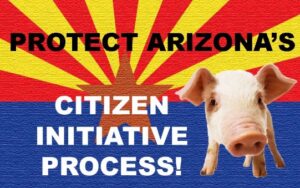Arizona Ballot Measure Recommendations
ADLA urges animal advocates to reject measures referred to the ballot by legislators that threaten our citizen initiative process, which is our most important tool for protecting animals. Arizona’s citizen initiative process is a constitutional right enacted at statehood in 1912. One of the Arizona founders’ biggest concerns was the right of citizens to pass laws when the legislature refused to act. The first citizen initiative passed in Arizona recognized women’s right to vote. Thanks to grassroots citizen ballot measures, voters banned indiscriminate leghold traps, snares, and poisons on public lands in 1994. Cockfighting was outlawed in 1998. In 2006, voters prohibited the inhumane confinement of pregnant pigs and calves raised for veal in industrial agricultural operations. All these measures failed in the legislature yet were passed by Arizona voters, most by landslide margins. In 1998 the Voter Protection Act was passed to prevent the legislature from undermining citizen initiatives passed by voters. Over the years, the legislature has placed a number of referendums on the ballot that could have destroyed our public initiative process but voters overwhelmingly defeated most of referred measures, indicating the strong determination of citizens to defend voting rights.
Vote NO on Prop 134
Prop 134 would require citizen initiative campaigns to collect signatures from 10 percent of electors from each legislative district in order to qualify for the ballot. Currently, initiative campaigns must submit signatures from 10 percent of all voters statewide, not in each of the 30 legislative districts. This measure would make it virtually impossible for grassroots groups to place citizen initiatives or referendums on the ballot. While wealthy campaigns might be able to hire enough petition circulators, it would be insurmountable for campaigns that rely primarily on volunteers. The other factor is that an initiative could be blocked by a small number of residents in one or more legislative districts who can gather enough opposition. This would allow a small minority to make decisions for the majority of voters. If Prop 134 had been in place at the time, it could have prevented the initiatives that banned traps and poisons on public lands, cockfighting, and inhumane farm animal confinement from being placed on the ballot.
Vote NO on Prop 136
Prop 136 would allow anyone to file a lawsuit in court to challenge the constitutionality of citizen initiatives while campaigns are still gathering signatures to place a measure on the ballot. If a court finds the measure unconstitutional, it prohibits the Secretary of State from certifying or printing the measure on the ballot. Prop 136 would force citizen initiative campaigns to raise large amounts of money to fight constitutional challenges from anyone who opposes the initiative. This would make it virtually impossible for grassroots citizen initiative campaigns to place a measure on the ballot. Had this measure been in effect, it could have blocked animal protection initiatives from even reaching the ballot for voters to consider.
Vote NO on Prop 315
Prop 315 would grant the Arizona Legislature power over rulemaking authority of state agencies. For example, this measure could overturn the Arizona Department of Agriculture’s rule that provides more humane treatment of laying hens by requiring that eggs produced and sold in Arizona must come from hens free from cage confinement. It could also overturn the Arizona Game and Fish Department’s rule that banned predator killing contests throughout the state. Predator killing contests are organized events in which participants compete for prizes based on the number of animals killed. Before Game and Fish enacted the ban, hundreds of animals—including coyotes, foxes, bobcats, and mountain lions were killed at these events all year long in Arizona.
Be a Voice for Arizona Animals – VOTE!

